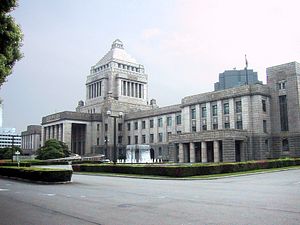Japanese Prime Minister Shinzo Abe’s landslide victory in December’s snap election placed both him and his Liberal Democratic Party (LDP) in a powerful position. With the victory, Abe joins former Prime Minister Junichiro Koizumi (2001-2006) as the only leaders in decades to hold power for over two years. Since Koizumi, a streak of lame duck prime ministers barely managed to scrape out 12 months in office (one of these, of course, being Abe himself from 2006-2007). December’s result, while a coup, still leaves both Abe and the LDP in a difficult position to attain what many Japanese conservatives and nationalists consider a prime objective: total constitutional overhaul.
Should Abe and some LDP parliamentarians have their way, Japan’s post-war constitution would undergo a complete overhaul. Under the most recent LDP proposals, Japan’s emperor would be appointed “head of state” — an upgrade from the figurehead position he currently occupies and a throwback to the Meiji era. Similarly, the party would likely omit the language currently seen in Article 11 discussing fundamental and universal human rights, replacing it instead with a celebration of Japan’s unique historical heritage and cultural legacy. Article 9, similarly, which famously renounces Japan’s right to wage war except in self-defense would undergo a complete overhaul. The LDP would likely redefine Japan’s Self-Defense Forces (SDF) as a National Defense Force, an expeditionary force capable of undertaking operations abroad including international peacekeeping missions. These changes would stack on last year’s decision to reinterpret Article 9’s ban on collective self-defense.
Obviously, this sort of constitutional overhaul would be terribly destabilizing to the already frigid international relations of Northeast Asian states. Chinese and South Korean fears of a resurgent nationalist Japan would be amplified. Fortunately, Abe and the LDP, even with their powerful political situation after December’s election, are a long way from attaining constitutional reform.
First, the LDP victory in last month’s election has perhaps been overstated. The party and its coalition partner Komeito won a super majority in the House of Representatives, the lower house of the Diet, but only hold a simple majority in the House of Councilors (upper house) as a coalition. Constitutional overhaul requires two-thirds approval in both the House of Representatives and Councilors — similar to several other constitutional democracies. Worse yet for the LDP, the ultimate approval of a proposed amendment which has already received two-thirds support from both houses of the Diet is subject to a popular referendum, which must pass with a majority. Crucially, this is determined by Article 96 of the current Japanese constitution which reads:
Amendments to this Constitution shall be initiated by the Diet, through a concurring vote of two-thirds or more of all the members of each House and shall thereupon be submitted to the people for ratification, which shall require the affirmative vote of a majority of all votes cast thereon, at a special referendum or at such election as the Diet shall specify.
You might suggest that Abe and LDP should then focus their energies on lobbying for an amendment to Article 96 itself. While Article 96 does seem to be the major factor holding back the LDP from simply strong-arming Japan’s disorganized political opposition into a series of political arrangements, the situation is far more complicated. The LDP’s coalition partner, Komeito, is strongly against the LDP’s proposed constitutional amendments. Without the backing of Komeito, the LDP’s position in both houses of the Diet is considerably muted.
As last year’s decision to reinterpret Article 9’s ban on collective self-defense demonstrated, Abe and the LDP are well aware of the long road to constitutional overhaul and are content to push through changes by fiat. This, too, may prove difficult for the administration in 2015. The collective self-defense decision drew considerable popular criticism, and there is little to suggest that the Japanese public have fully come around to supporting Abe’s vision despite the recent election. One under-cited figure from December’s snap election is the national turnout — at 52 percent, the lowest in Japan’s post-war history. This indicates voters really saw no alternative to Abe and the LDP given the state of Japan’s opposition parties and either did not vote or voted reluctantly. Abe’s detractors may have indeed been eager to vote in change; after all, the Communist Party of Japan managed to triple its number of Diet seats, winning 21. Add to this the fact that once “Abenomics” lost its sheen, Abe’s approval ratings have lethargic at best.
In consideration of the obstacles to constitutional reform and the weak evidence in favor of widespread popular support behind Abe, it’s highly unlikely that 2015 will be the year that the great Japanese conservative nationalist aspiration of constitutional overhaul comes true. Yes, Abe and the LDP are in a powerful position and will likely lead Japan well into 2016 and possibly beyond then, but they’ll do so under the same constitution as their predecessors.

































